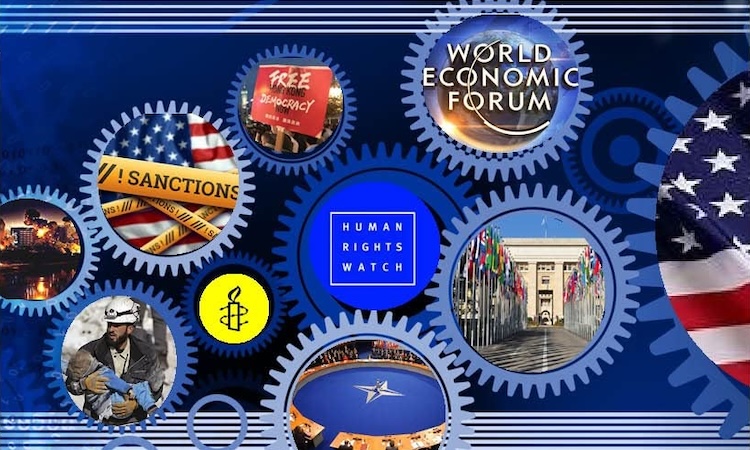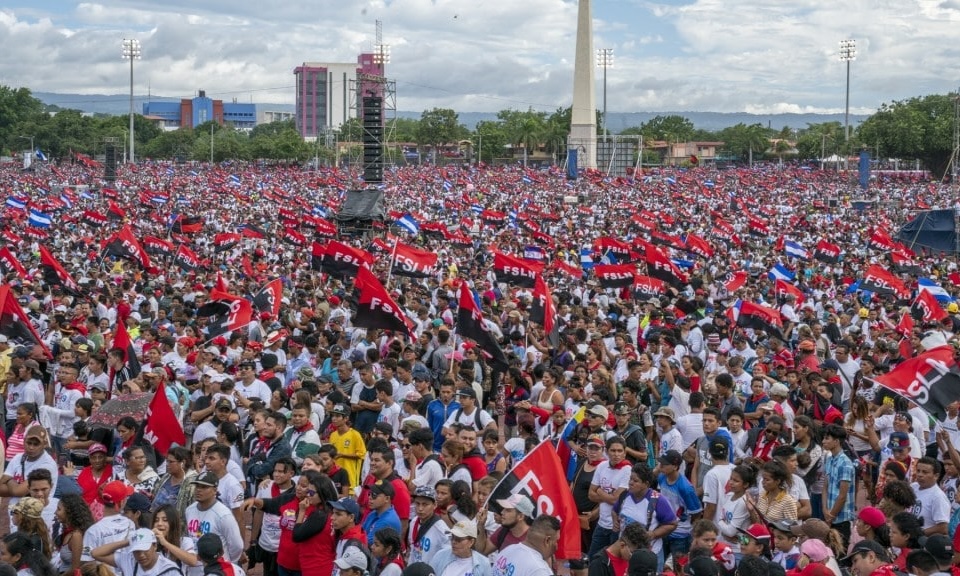On 7 November 2021, the Republic of Nicaragua held national elections to elect its president, national assembly and representatives to the Central American Parliament. Incumbent president Daniel Ortega was re-elected by an overwhelming majority, receiving 75 percent of the votes polled on a 65 percent turnout.
President Ortega’s party, the Sandinista National Liberation Front (FSLN) also held on to the vast majority of seats in the national assembly (75 out of 91).
Western ‘democracy’ outraged
A cursory internet search would lead us to believe that the Nicaraguan elections were a ‘sham’, a ‘parody’, a ‘farce’, even a ‘pantomime’, and that the popularly elected president has ‘crushed dissent’ in order to secure victory. (Guardian, CNN et al)
While it is not the intent of this article to provide psychoanalysis of western corporate journalists, it is obvious to most that these descriptions of the Nicaraguan elections are pure projection, designed to convince western populations that elected leaders resisting imperialism are ‘authoritarian dictators’ whilst the bourgeois dictatorships of imperialist countries are the leading lights of ‘democracy’, ‘human rights’ and ‘progress’.
Unsurprisingly, the European Union also condemned the election, while Iran, north Korea, Bolivia, Palestine, Russia, Syria, Venezuela and Vietnam sent congratulations to the president on his re-election. The states that recognised the legitimacy of Nicaragua’s elections have their own experience of the imperialists and their mouthpieces in the media trying to undermine the results of democratic elections and attempting to overturn the will of their people by any and all means.
Venezuela is the most farcical recent example, where the western world simply declared and ‘recognised’ opposition ‘leader’ (in reality a minor figure) Juan Guaidó as the country’s ‘rightful’ leader, even though he has never even been a candidate in a presidential election. Nevertheless, the US and Britain still cling to this absurd claim despite more than three years of its failure as a regime-change strategy.
A pantomime election?
So what happened in Nicaragua’s elections to incite the outrage of imperialism and its defenders?
A reporter from the New York Times claimed that opposition parties were prevented from participating in the elections, a claim that is laughably and demonstrably false. Pictures of voting cards taken in polling booths across the country show the candidates were varied and included many parties opposing the Sandinistas.
Many of these smaller parties received thousands of votes, with the Constitutionalist Liberal Party (PLC) achieving nearly 14.33 percent of the vote and taking nine seats in the assembly. Quite a result considering that opposing parties were supposed to have been prevented from standing!
The BBC, meanwhile, ran an interview with a supposedly ‘exiled’ Nicaraguan citizen and supporter of the Blue and White National Unity movement (a movement seemingly formed to advance the interests of business owners). On cue, this helpful interviewee branded the elections as fraudulent and urged the ‘international community’ to condemn them.
Such reports in the western corporate media, usually quoting anonymous citizens, are used to justify denouncing the election as a whole and rejecting its outcome.
By contrast, as many as 40 percent of Americans believe the 2020 election of President Joe Biden was fraudulent. This is not seen by the presstitute fraternity as evidence that the US election was illegitimate, however. Instead, they announce that almost half of the American public are ‘conspiracy theorists’ or victims of ‘misinformation’ – and call for greater censorship of social media!
Whether true or not, the US imperialists and their Nato allies ultimately don’t believe they must provide evidence of their accusations. It is not truth they seek, but domination. President Ortega and the Sandinistas find themselves in contradiction with US imperialism and must be removed, by any means necessary.
The propaganda pushed by western corporate journalists is designed to keep its citizens in the dark as to the reality of life for Nicaraguans. It is aimed at manufacturing consent for sanctions, and ultimately for the overthrow of sovereign states, so the imperialists can expand their markets, exploit cheap labour and resources, and demonstrate their crushing power to any others who may want to stand up for their right to independence and sovereignty.
Democracy for imperialists
This pattern repeats itself so often that there is an almost formulaic and lazy approach by the imperialists and their corporate media lackeys to elections held in anti-imperialist countries.
If the people of a country elect a leader who is willing to resist imperialist domination, who won’t allow the west to strip the country’s natural resources and superexploit its people, this person is automatically a ‘dictator’ (see Syria, Bolivia, Venezuela, etc). If a progressive and anti-imperialist candidate is defeated in circumstances that are suspicious and which indicate electoral interference or fraud (as in the 2021 Ecuadorian election) then the victorious candidate (the stooge of the imperialists) is a shining example of the power of democracy and the will of the people!
The increasingly aggressive sanctions and rhetoric being used against independent nations and their leaders reflect a certain desperation. The imperialists have recently failed to expand their markets and install puppet regimes in many of their target countries, many of which are receiving solidarity and fraternal support from China and Russia, the cornerstones of an increasingly coordinated anti-imperialist front.
The imperialists have failed to take hold of Afghanistan, Syria or Bolivia. They have failed in their attempts to destroy Iran, Venezuela and Belarus. Resistance to imperialism remains strong in Cuba, Nicaragua, Russia and China. Where do the imperialists have to turn?
The Organisation of American States (OAS)
Since the election, the Organisation of the American States (OAS), of which Nicaragua is a member, has passed a motion condemning the election results, proclaiming that they were “not free, fair or transparent and lack democratic legitimacy”. Out of 35 OAS member states, 25 voted in favour of the motion, prompting Nicaragua to begin the process of withdrawing from the organisation.
Immediately after the re-election of President Ortega and hot on the heels of the OAS motion, US President Biden signed the RENACER Act, which will impose more crushing sanctions on Nicaragua, no doubt in an attempt to undermine the country’s economic and social progress and to turn the people against the Sandinistas (a tactic that has been used so far unsuccessfully in Cuba, north Korea, Iran, Venezuela and elsewhere).
Foreign minister Denis Moncada pointed out that the OAS is “a diplomatic political forum that was born under the influence of the United States as an instrument of interference and intervention”.
In an interview with journalist Ben Norton of the Grayzone, Michael Campbell, a foreign policy advisor to President Ortega, gave a more detailed explanation of Nicaragua’s decision to leave the OAS, outlining the steps the government has taken in sharing the truth with other OAS member states, and presenting information to the Inter-American Commission on Human Rights. This information, said Campbell, “they choose to reject … and instead join in this campaign against Nicaragua, a campaign that is aimed at overthrowing the government of Nicaragua”.
The process for Nicaragua to be released from the OAS could take as much as two years, though Campbell hopes it won’t ultimately come to that, pointing out that while the country has tried to maintain respectful relations with OAS member states, it has received aggression in return.
It is easy to see that while the OAS specifically, and Latin America more broadly, remains in the United States’ ‘sphere of influence’, there is no other option for independent and anti-imperialist states but to remove themselves from so-called ‘multilateral’ organisations where they leave themselves open to bullying and infiltration with no real recourse. Better to further develop voluntary unions with other countries that have a shared interest in opposing and resisting the imperialist system and improving the lives of their people.














